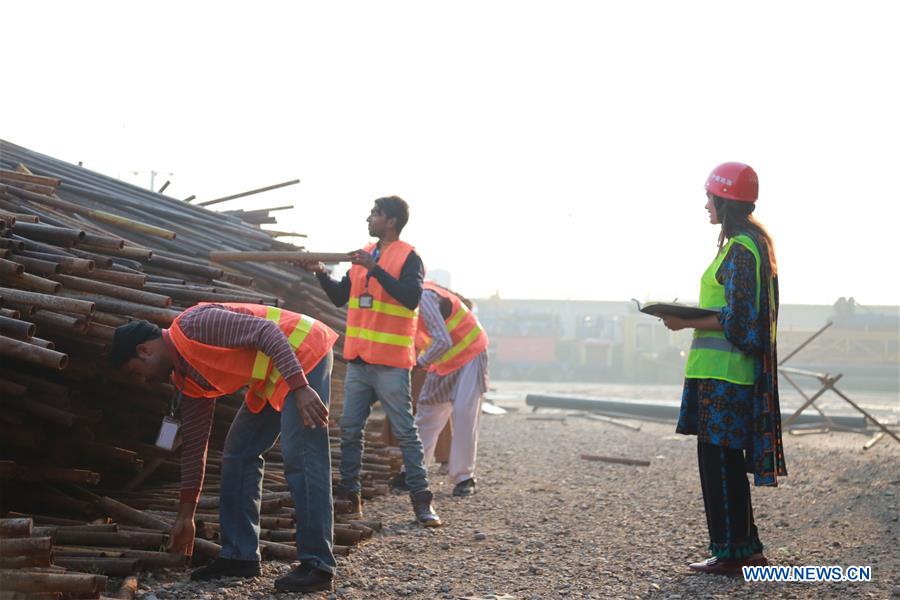
A Pakistani woman works at the construction site of Multan-Sukkur Motorway under the China-Pakistan Economic Corridor in Pakistan on March 12, 2019. (Xinhua/Luo Xiangjun)
by Misbah Saba Malik, Liu Tian
ISLAMABAD, March 21 (Xinhua) -- Ambreen Shah was confident of a better future when she joined the Chinese company working on a power project under the China-Pakistan Economic Corridor (CPEC) in Southwest Pakistan's Balochistan province.
Shah joined the China Power Hub Generation Company (CPHGC) as head of the legal department and was later promoted to vice president for Legal and Corporate Affairs for her hard work and expertise.
Shah told Xinhua that working in the Chinese company not only enabled her to excel, but also allowed her, a mother, to strike a better balance between her work and personal life than in a transnational company where she was previously employed.
"Their differences are from the Chinese culture. So, this is what makes it easy to work with them because they want to understand others and they want to adjust to that too," Shah added.
The power plant project with an estimated cost of 2 billion U.S. dollars and cutting-edge environmentally-friendly technology is expected to generate enough electricity to meet the needs of some 4 million households.
WOMEN LEARN SKILLS THROUGH CPEC PROJECTS
Shah said over 30 percent of the employees at CPHGC are women, some of them in important positions.
"There is absolutely no gender discrimination by (the) Chinese when they hire workers. They'd rather look at qualifications and competence levels," said Shah.
For her and many other Pakistani women, the CPEC provides an opportunity for them to learn skills and values which will not only help them excel in work, but also help them become stronger in facing challenges in life.
CPEC, a corridor linking Pakistan's Karachi and northwestern Peshawar and running through the populous provinces of Punjab and Sindh, highlights energy, transport, industrial cooperation and Gwadar port construction. Seeking to expand cooperation to such sectors as finance, science and technology, education, poverty alleviation and urban planning, the corridor is a major pilot project under the China-proposed Belt and Road Initiative (BRI).
"The women who are working here, have not just gained knowledge and expertise on the technical side of the project management, but they have also learned teamwork, ... about how to get more support from each other and to provide more support. I think this is something that I really like about CPEC projects. They make you strong," Shah said.
According to Pakistan's official data, CPEC has provided over 70,000 direct jobs for Pakistanis since it was launched in 2013.
Addressing a seminar earlier, Pakistan's Minister for Human Rights Shireen Mazari said job opportunities for women will increase tremendously in the forthcoming industrial cooperation under CPEC.
CPEC is also a boon to Pakistan's blue-collar women workers, who can enjoy health care, education and a better work environment in Chinese companies.
The Thar region of South Pakistan's Sindh province is considered as one of the most underdeveloped areas in Pakistan, which is hard hit by droughts and people there are largely engaged in animal husbandry and agriculture.
Krishna Kumari, a senator from the Thar Desert area, said hope has increased for women in her district when Chinese companies under CPEC brought them jobs.
The senator said locals who have been trained under CPEC projects could take home a handsome amount of money every month. In many households, women can now earn more than men, thus reducing their financial dependence on men and enabling them to pursue their dreams through hard work, she said.
EMPOWERMENT OF RURAL WOMEN
In Pakistan, rural women usually do not actively take part in political affairs. Unlike in the rest of the country, women voters outnumbered men in Thar during the last general elections -- an evidence of the empowerment of women, said Kumari.
According to a UN Women report, women account for only 22 percent of the labor force aged 15-64 in Pakistan, and about 73 percent of the women workers are associated with agriculture, forestry, hunting and fishing sectors.
Musarrat Amen, an assistant professor for Defense and Diplomatic Studies in Fatima Jinnah Women University Rawalpindi, said CPEC gave more women employment opportunities in non-agriculture fields, broadening the Pakistani women's vocational scope.
Amen obtained her PhD in international relations from a reputable Chinese university. After returning to Pakistan, Amen published several research papers on the CPEC. She is currently writing a book on the mega project to address the frequently asked questions from students and researchers about the CPEC.
"Being associated with China for a long time, I was asked questions about CPEC. To address queries of my students I started research on CPEC, and the deeper I dug into it, the more I learnt how it is going to be a game changer for Pakistani economy," Amen said.
She said that the CPEC is a "hot topic" for Pakistani scholars and seminars, and she is often invited as a guest speaker at conferences.
"I am teaching women and I know that Pakistani women have a lot of potential and their potential can be tapped by the CPEC. As Chinese women were equal agents of China's economic change, through CPEC Pakistani women will also get chance to contribute to the Pakistani economy," said the scholar.
(Video reporters: Liu Tian, Jiang Chao; Video editor: Lin Lin)



